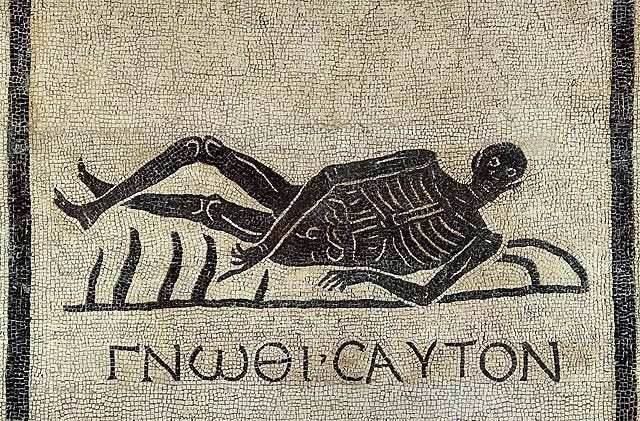Dear Classical Wisdom Reader,
Napoleon was not actually that short... he was average height at the time.
You can not see, unassisted, the Great Wall of China from space.
And obvious to our Classics loving community, before Christopher Columbus, not everyone thought the world was flat.
(Pythagoras, Aristotle and in the 3rd century BC Eratosthenes had already calculated the Earth's circumference with remarkable accuracy.)
But perhaps the best ‘factoid’ of all... is that factoid was not originally defined as a trivial or small piece of information, but as a false statement presented as fact. Essentially, it is information that everyone -through the sheer magnitude of repetition- thinks is true.
And if you are nonplussed by that realization, also take a look at the word nonplussed...
Of course finding out the truth of words, phrases or indeed entire stories and treatises is one of life’s great pleasures (along with the opportunity -truth be told- of passing on that wisdom). So while we cover the full range of topics from the ancient world, including dealing with death, propaganda in politics, and fantastic monsters in myth, today we’ll enjoy a lighter subject and one that can be employed easily at the dinner table among friends and family: That of misused proverbs.
Turns out many of the great poets’ lines have been misappropriated for all sorts of different reasons...Fun factoids for all!
Have a read below and let me know: How many of these latin proverbs did you know? Were there some that surprised you? And what other great proverbs have been... distorted through the distillation of time?
But before you delve into the misunderstood, a quick reminder that this Friday is our big event on “Why Socrates Matters”. Featuring some seriously fantastic professors and authors, we’ll get into the truth of the great philosopher to see just how much we can benefit from his teachings today.
I hope you can join us!
Now, check out the Latin Proverbs below and write in your favorite misunderstood aphorisms, phrases, and quotes in the comments section. Let’s see if we can find more famous factoids from the ancient world…
All the best,
Anya Leonard
Founder and Director
Classical Wisdom
P.S. Before I get several write-ins to point this out: I do realize that ‘factoid’ has -through the sheer magnitude of repetition- been accepted as a trivial piece of information, in the United States.
Personally, I reckon this factoid is a wonderful opportunity to question the prescriptive/descriptive nature of language. Should it change because of how it's being used? Or should speakers be reminded on how to speak? So much fodder for discussion, below.
Four Common(ly misunderstood) Latin Proverbs
by Visnja Bojovic
The other day a student told me that, during her studies as an art student, she had to sculpt a small statue as an assignment for one of her courses. She did so without having put much thought into it. The professor approached her and started praising her work, giving it much more and much different meaning than the one she originally wanted to convey by making the statue.
My student did not say anything, as the situation was favorable to her, but there sure are situations in which misinterpreting a product of art can lead to misunderstanding and forming a wrong image of the author and the message he/she originally wanted to get across.
This is often the case with quotes from literature, especially the ancient ones that we regularly use for our own purposes—whether it is to express an attitude, to defend an opinion, show our feelings, or even just to sound smart.
We write a sentence, wrap it into quotation marks and undersign an author to it as if it was his/her personal opinion. However, do we ever stop to wonder where these thoughts come from, and what the sentiment of the author originally was?
What if even half of those phrases were just opinions expressed by the characters in the work, and not those of the author? For those of you that still haven’t watched Fight Club: what if I told you that Helena Bonham Carter was not the one saying, “And suddenly I felt nothing”, and that all those screenshots with that quote under her face were misleading?
Unfortunately, this misattribution happens just as much with the sayings and maxims of the ancient world.
Here are a couple of Latin proverbs that are common but which are often used without much knowledge of their context or background:
1. Omnia vincit amor (Love conquers all)
This famous line belongs to one of Virgil’s bucolic (pastoral) poems. The world of bucolic poetry (as it was known to Virgil) used to be idyllic and distant from the noise and crowd of the city. It was a world where shepherds could sing (often competitive singing) about their love and passion, celebrate nature or play syrinx and Pan’s flute.
Virgil used the same scenery, but wrote about real people, his contemporaries, represented as shepherds. The main character of this bucolic poem is the elegiac poet Gallus, represented as a shepherd in the lands of Arcadia (where the idyllic scenario is placed for ages of art to come thanks to this particular poem).
This phrase is usually quoted in the defense and celebration of love, and its power to overcome all obstacles. In the poem, Gallus is madly in love and is suffering. We read about the deities coming to rescue him and talk him out of love, but it is all in vain.
Finally, love wins, but not quite as we would have expected. Despite all the efforts of the gods, love leads to Gallus’ death, and that is the victory Virgil is referring to in the famous phrase. The main message of this phrase is rather related to the devastating power that love has rather than its ideal victory that leaves the meant-to-be couple satisfied.
2. Mens sana in corpore sano (A healthy mind in a healthy body)
The most famous slogan of many fitness companies has its origin in the writings of an ancient Roman satirist Juvenal, who was active in the 1st century AD (the original thought goes further back in history, as early as 7th century BC, to Thales). His most famous work, Satires (Saturae), is best known for its criticism of Roman society under the rule of the notorious Domitian and his successor Nerva, along with its criticism of mankind as a whole.
The sentence Mens sana in corpore sano belongs to Satire X, one of his most influential poems. The poem is dealing with the earthly ambitions of mankind, and its goal is to show that they all lead to disappointment. What we should pray for, are “a healthy mind in a healthy body, and a strong spirit”. The actual message of the author is that we should nourish our mind and body equally, not that a healthy body automatically means a healthy mind, as has been believed.
3. Homo sum: nihil humani a me alienum puto (I am a man, I consider nothing human alien to me)
Taken out of context, this line has been interpreted in various ways. However, its context gives it a surprising turn. This line was written by the famous playwright Terence, in his comedy Self-Tormentor.
The plot revolves around a wealthy old man, Menedemus, who is angry with his son, Clinia, for having a relationship with a penniless girl. He scolds him, holding up his own career as a soldier, which Clinia takes literally and goes to East to live as a soldier.
The play begins with Menedemus working in the field (as a form of self-punishment), and his neighbor asking him why he is working in the field when he has so many servants that can do that for him. When Menedemus tells him to mind his own business, the neighbor answers Homo sum: nihil humani a me alienum puto.
Who would have thought that this influential sentence was originally just a justification of poking the nose into other people’s lives!?
4. Tanta stultitia mortalium est! (What fools these mortals be!)
It is well known that Horace’s famous Carpe diem is about making the best out of every moment and not wasting time on pointless things. However, not many people know the stultitia (stupidity) that Seneca refers to in the phrase above is related to the same concept. It is from one of his Moral Letters, titled On saving time—which does a good job summing up Seneca’s general attitude towards wasting time (which he himself didn’t respect too much, but that’s a subject for another article). Here is the full thought:
“What fools these mortals be! They allow the cheapest and most useless things, which can easily be replaced, to be charged in the reckoning, after they have acquired them; but they never regard themselves as in debt when they have received some of that precious commodity, -time!”
Therefore, next time you cannot make yourself productive, instead of Carpe diem, try motivating yourself with Seneca’s line – you’ll be surprised by the effect!
In some of these cases, the proverb did not mean what it was commonly thought to have meant. In others, it turned out to mean much more. Perhaps after reading this you feel as though you’ve lost a proverb you loved to live by. Don’t be discouraged! The ancient world is filled with wisdom and advice for us. Where one saying, maxim, or proverb turns out to lose the meaning you thought it had, there surely is another waiting to be found...









You forgot Semper ubi sub ubi.
Hi Anya,
Since, I believe, the suffix "-oid" derives from the Greek oeidos (eidos) -form/resemblance (something we see or think we see), as an asteroid resembles a star (Greek aster), could we not agree that a factoid has the form of or resembles a fact. Thus the truth of that "fact" lies in the "eye of the beholder"!
Amor omnia vincit - there is also labor omnia vincit. So I guess if you love to work you are all over "conquering everything"!
Mens sana in corpore sano - I've always believed that to mean that we should strive for both, and not that achieving one would automatically lead to the other. Schools that have chosen this saying as a motto were not telling their students that if you performed well in phys ed you were sure to ace your Latin exam!
I would love to go on, but Tempus fugit (the story in my novel The Latin Student is interspersed with proverbs and sayings (including some from Seneca).
Denis Brault